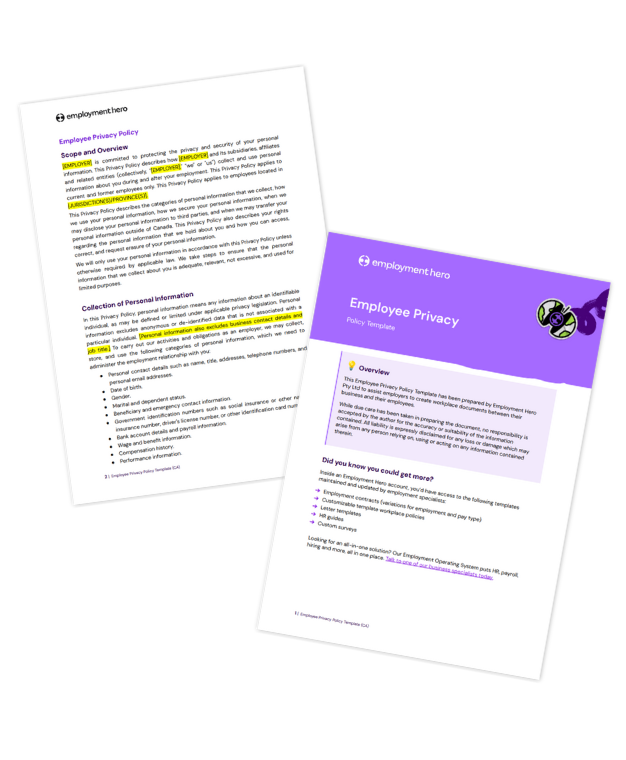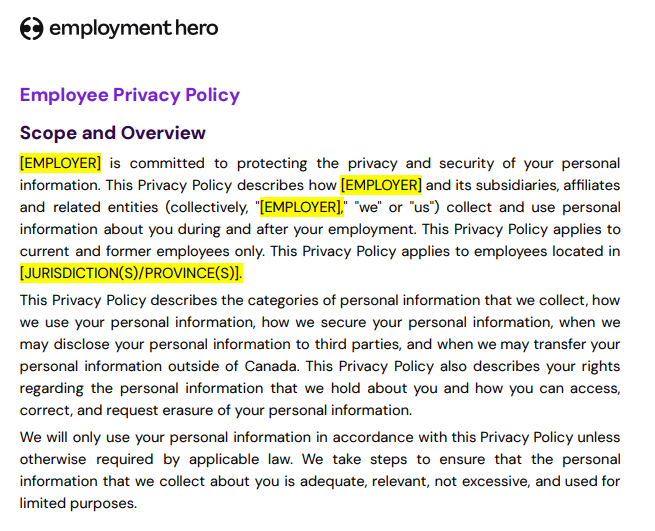Employee privacy policy: The ultimate guide for Canadian employers
Published
Employee privacy policy: The ultimate guide for Canadian employers
Published
Navigating the complex landscape of employee privacy is a growing concern for Canadian employers. In a world where digital data is constantly being shared and stored, protecting your employees’ personal information is more critical than ever.
Canadian privacy laws, such as the Personal Information Protection and Electronic Documents Act (PIPEDA), require employers to be transparent and compliant with how they handle employee data. However, many employers don’t know where to start. They’re left wondering what information they can collect, how to store it securely and what their legal obligations are.
This guide will demystify employee privacy in Canada. We aim to provide you with a clear understanding of your obligations, the legal context and you’ll get a ready-to-use, editable employee privacy policy template to get you started.

What is an employee privacy policy?
An employee privacy policy is a formal document that explains how an employer collects, uses, stores and discloses the personal information of their employees. Think of it as a rulebook that sets clear expectations for both the company and its staff.
The primary purpose of a privacy policy is to be transparent about your data practices. It lets your employees know exactly what information you’re collecting, why you’re collecting it and what their rights are.
Why every employer needs one
Having a well-drafted privacy policy is more than just a good idea; it’s a critical tool for protecting your business and building trust with your employees.
Protects against legal risk
A privacy policy is your first step against legal action. It can help protect you from:
- Privacy complaints: Employees can file complaints with provincial or federal privacy commissioners if they believe their privacy rights have been violated.
- Fines and penalties: Non-compliance with privacy laws can lead to significant fines.
- Wrongful dismissal claims: A clear policy can be a key piece of evidence in cases where an employee alleges their termination was related to a privacy dispute.
Builds trust and transparency
When employees know their personal information is being handled responsibly, it builds a foundation of trust. A clear policy demonstrates that you respect your employees’ rights and take their privacy seriously.
Aligns with Canadian privacy laws
In Canada, employers must comply with federal and provincial privacy laws. A comprehensive policy helps ensure your practices align with these legal requirements, including PIPEDA and other provincial legislation.
Legal framework for employee privacy in Canada
Navigating Canadian privacy laws can be tricky because the rules can vary depending on where your business is located.
Federal law: PIPEDA
The Personal Information Protection and Electronic Documents Act (PIPEDA) is the federal law that governs how private sector organizations collect, use and disclose personal information. It applies to all employers in federally regulated industries (like banks and airlines) and to companies that handle personal information across provincial borders.
For other private sector employers, PIPEDA applies unless the province has its own “substantially similar” privacy legislation.
Provincial exceptions
Some provinces have their own private sector privacy laws that take precedence over PIPEDA. These laws often have additional requirements or different rules. For example:
- Quebec: The new privacy law, Law 25 (An Act to modernize legislative provisions as regards the protection of personal information), has some of the strictest rules in Canada. It requires organizations to be more transparent and to appoint a Privacy Officer.
- Alberta: Alberta’s Personal Information Protection Act (PIPA) is similar to PIPEDA but has its own unique rules for specific situations.
- British Columbia: B.C.’s PIPA applies to all private sector organizations within the province.
Consent requirements
Generally, you need an employee’s consent to collect, use or disclose their personal information. However, there are exceptions. For example, consent isn’t always required for information necessary to manage the employment relationship (e.g., payroll details). Your privacy policy should clearly explain when and how you will obtain consent.
|
Province/Jurisdiction |
Applicable private sector law |
Key differences |
|---|---|---|
|
Federal (PIPEDA) |
Federal, applies to federally regulated industries and inter-provincial trade. |
Sets baseline rules for consent, collection, and security. |
|
Quebec |
Law 25 (An Act to modernize legislative provisions…) |
Stricter rules, mandatory Privacy Officer, and increased transparency requirements. |
|
Alberta |
Personal Information Protection Act (PIPA) |
Similar to PIPEDA but with specific provincial regulations. |
|
British Columbia |
Personal Information Protection Act (PIPA) |
Appoints a Privacy Commissioner to oversee compliance. |
|
Ontario |
PIPEDA (in most cases) |
No province-specific private sector law for general employers, but others exist for specific sectors. |
What to include in your employee privacy policy
A comprehensive privacy policy should address all aspects of how you handle personal data. A good policy will include sections on:
- Types of information collected: List all the data you collect, such as contact information, payroll details, health information and performance records.
- Purpose for collection: Explain why you need to collect this information. For example, you need bank details for payroll and health information to administer benefits.
- Consent process: Outline how you obtain and manage employee consent.
- Storage and security measures: Describe the steps you take to protect employee data from unauthorized access, loss or theft.
- Employee access to their information: Explain how employees can request to view or correct their personal data.
- Disclosure rules: Detail the circumstances under which you might disclose personal information to third parties, like payroll processors or benefits providers.
- Employee monitoring: Clearly state what your policy is on monitoring company email, internet usage and video surveillance.
- Retention and destruction: Describe how long you keep employee records and how you securely dispose of them when they’re no longer needed.
- Breach reporting: Outline the procedures you will follow if a data breach occurs.
How to create and implement your policy
Creating an effective privacy policy doesn’t have to be a daunting task. Follow these steps to ensure you’re on the right track.
- Review applicable laws: Start by understanding which federal and provincial laws apply to your business.
- Map the personal data you collect: Make a list of all the personal information you collect from employees.
- Draft the policy using the template: Use our customizable template as a foundation to build your policy. It’s designed to be easily adapted to your business and provincial laws.
- Consult legal/HR for review: It’s highly recommended to have a legal professional or an HR expert review the policy to ensure it meets all legal requirements.
- Communicate to employees: Once finalized, communicate the policy to all employees. Consider holding a training session and requiring employees to sign an acknowledgment form.
- Review and update regularly: Privacy laws change. Make it a practice to review and update your policy annually or whenever there are legal changes.
Employee privacy policy template
Here’s a preview of the letter template you can download and customize based on your requirements:

Best practices for maintaining employee privacy
A policy is only as good as its implementation. Here are some best practices to follow to maintain employee privacy.
- Minimize collection: Only collect personal information that is absolutely necessary for the employment relationship.
- Be transparent: Always be open about your data collection practices.
- Secure storage: Store all employee data securely, whether it’s in physical files or digital databases.
- Train staff: Train your staff on the importance of privacy and the proper handling of personal information.
- Test and audit: Regularly audit your privacy practices to ensure they are being followed correctly.
Avoiding common mistakes
Don’t let your privacy policy fall short. Make sure you’re protecting your business and avoid these common pitfalls:
- Using overly broad monitoring policies: Your policy should be specific about what you monitor and why.
- Failing to get consent: Make sure you have the necessary consent when required by law.
- Not tailoring the policy to provincial laws: A “one-size-fits-all” policy can leave you in legal risk.
- Forgetting to update: Privacy laws and your business practices change. Your policy should too.
Take control of your privacy obligations today
Balancing your business’s operational needs with your employees’ right to privacy is crucial. A comprehensive and unambiguous privacy policy is the cornerstone of this balance. It protects your business from legal risks, builds trust with your team and ensures you’re meeting your legal obligations. Don’t wait for a data breach or legal complaint to take action. Take control of your privacy obligations today.
FAQs about employee privacy
While it’s not always a legal requirement to have a separate policy, it’s a best practice to ensure compliance and transparency. The law requires you to be transparent about your data practices and crafting a policy is the most effective way to do this.
Yes, but with limitations. The purpose of the monitoring must be reasonable, and you must inform employees about the monitoring.
You can only store information that is necessary for the employment relationship, such as contact details, payroll information and performance records.
You should only keep records for as long as they are needed for the purpose they were collected for or as required by law. Most provinces have specific rules for how long you must retain certain records.
A breach of confidentiality could be an employee sharing another employee’s personal information (e.g., their salary or medical history) with an unauthorized person.
The information in this template is current as at 1 August 2025, and has been prepared by Employment Hero Pty Ltd (ABN 11 160 047 709) and its related bodies corporate (Employment Hero). The content is general information only, is provided in good faith to assist employers and their employees, and should not be relied on as professional advice. Some information is based on data supplied by third parties. While such data is believed to be accurate, it has not been independently verified and no warranties are given that it is complete, accurate, up to date or fit for the purpose for which it is required. Employment Hero does not accept responsibility for any inaccuracy in such data and is not liable for any loss or damages arising directly or indirectly as a result of reliance on, use of or inability to use any information provided in this template. You should undertake your own research and seek professional advice before making any decisions or relying on the information in this template.

Download the Employee Privacy Policy Template
Related Resources
-
 Read more: The real cost of payroll mistakes in Canada (Report)
Read more: The real cost of payroll mistakes in Canada (Report)The real cost of payroll mistakes in Canada (Report)
38% of Canadians faced payroll errors. Discover how mistakes impact trust, finances and compliance – and how to fix them.…
-
 Read more: Master your team’s time off: Your essential year-end guide to vacation management
Read more: Master your team’s time off: Your essential year-end guide to vacation managementMaster your team’s time off: Your essential year-end guide to vacation management
Streamline time-off requests, coverage and pay. Stay compliant and stress-free with our Year-End Vacation Management Guide. Download your free copy…
-
 Read more: Navigating the End-of-Year Holiday Season: A Guide for Canadian SMBs
Read more: Navigating the End-of-Year Holiday Season: A Guide for Canadian SMBsNavigating the End-of-Year Holiday Season: A Guide for Canadian SMBs
Simplify time off, parties and CRA compliance this season. Build an inclusive, compliant workplace with our Holiday HR Guide for…

















